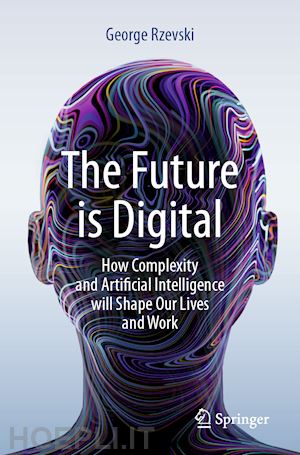
Questo prodotto usufruisce delle SPEDIZIONI GRATIS
selezionando l'opzione Corriere Veloce in fase di ordine.
Pagabile anche con Carta della cultura giovani e del merito, 18App Bonus Cultura e Carta del Docente
This book describes in an easily accessible way how artificial intelligence (AI) will help us to overcome the ongoing rise in complexity and thus shape our lives and work in a not-too-distant future. AI has proven to be the latest tool for resolving issues created by the most recent surge in complexity, and the corollary is: those who delay or ignore AI, will be overwhelmed by complexity.
The book starts with a broad description of the coevolution of technology and society that irreversibly leads to the sharp increase in complexity of our socioeconomic environment. The second chapter then covers concepts and principles of the new science of complexity which helps us to understand issues caused by socioeconomic complexity and provides methods for resolving them. Subsequently, a beginner’s guide to artificial intelligence helps readers to glance at fundamentals of this powerful technology capable of resolving issues created by socioeconomic complexity. Thedanger of allowing intelligent digital systems to make high-risk decisions as well as the consequences of possible misuse of AI for fraud and fake are also discussed. The following chapter explores the concepts of natural and digital ecosystems. Digital transformation of rigidly structured corporations and administrations into adaptive and evolving organisations are illustrated by a number of case studies. Next, the current hectic transition of industrial to digital society is described, its origins identified and outcomes predicted, highlighting issues created by the increase in complexity and showing how to resolve them using thinking tools such as a complexity mindset and digital tools such as artificial intelligence. Eventually, the last two chapters outline the author’s vision of the future digital economy and digital society.
This book is accessible to everyone who is curious to glimpse into the future, no previous special knowledge of digital technology isrequired. Especially decision makers in politics, business, administration, banking, policy making, education, healthcare and defence, and their advisors will benefit from the book, as it will help them to contribute to the creation of the brave new digital world. It may also support investors to recognise which elements of digital technology will play the most important role in the near future.
1. Coevolution of Technology and Society.- 2. A Gentle Guide to Complexity.- 3. Artificial Intelligence: Friend or FOE.- 4. Natural and Digital Ecosystems.- 5. We are in Transition from Industrial to Digital Economy.- 6. The New Digital Economy.- 7. The New Digital Society.
George Rzevski is Emeritus Professor, Complexity Science and Design Group, The Open University, Milton Keynes, UK. Until his retirement, George was the Head of Department of Design and Innovation, and Director of the Centre for the Design of Intelligent Systems. Rzevski Research Ltd., London, is his current business through which he conducts research in broad areas related to complexity science and AI, designs emergent AI systems and offers consulting services in digital transformation. His recent consulting projects include Digital City, for a prosperous Swiss metropolis, and Digital Insurance, for one of the largest Australian Insurance companies.











Il sito utilizza cookie ed altri strumenti di tracciamento che raccolgono informazioni dal dispositivo dell’utente. Oltre ai cookie tecnici ed analitici aggregati, strettamente necessari per il funzionamento di questo sito web, previo consenso dell’utente possono essere installati cookie di profilazione e marketing e cookie dei social media. Cliccando su “Accetto tutti i cookie” saranno attivate tutte le categorie di cookie. Per accettare solo deterninate categorie di cookie, cliccare invece su “Impostazioni cookie”. Chiudendo il banner o continuando a navigare saranno installati solo cookie tecnici. Per maggiori dettagli, consultare la Cookie Policy.